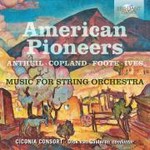
American Pioneers: Music for String Orchestra;
 $20.00
Out of Stock
$20.00
Out of Stock6+ weeks add to cart
VARIOUS COMPOSERS
American Pioneers: Music for String Orchestra;
Ciconia Consort, Dick Van Gasteren, direction
[ Brilliant Classics / CD ]
Release Date: Friday 4 December 2020
This item is currently out of stock. It may take 6 or more weeks to obtain from when you place your order as this is a specialist product.
Dick van Gasteren is the founder-conductor of the Ciconia Consort, a chamber orchestra based in The Hague since 2012. To mark 400 years since the Pilgrim Fathers left the Netherlands for America, he devised this programme of music from the first half of the 20th century, reflecting the particular character of 'New World' music as well as its roots in European romanticism. The result is a collection unique on disc, in beautifully sprung new recordings full of vitality and sympathy. Arthur Foote (1853-1937) numbered among the first generation of classical composers to be educated primarily in the US, and in the arching phrases, transparent textures and rich harmonies of his E major can be heard the Romantic heritage of Brahms and Wagner which exercised a dominant influence over American conservatoires in the late 19th and early 20th centuries, before pioneers such as Ives and Antheil loosed the cultural bonds between the two continents. The Hymn is the second of 'A Set of Three Short Pieces for String Orchestra' written by Ives in 1904: way ahead of its time, we might now think (and composed three years before Foote's Suite), in its probing harmony which ventures deep into and even beyond the expressionist world of Arnold Schoenberg, while retaining a solemn, devotional quality in the slowmoving textures and the passionate viola melody at its heart. In contrast to the darkness and uncertainty of Ives's Hymn, the Shaker music quoted by Aaron Copland in Appalachian Spring radiates quiet content and security. The Ciconia Consort are joined here by Dutch colleagues to present the final version of Copland's ballet, originally written in 1944 to a commission by Martha Graham for a piece with a distinctively American theme. An orchestral suite followed, thanks to the ballet's instant popularity, then a complete orchestral version, and finally a version of the suite for the 13 instruments of the original score. The book of the ballet tells the story of the 19th-century American pioneers celebrating spring, marriage, and the building of a new house. The album's final work dates from 1948, but you would be hard pressed to guess that its composer was once known as 'the bad boy of American music'. Born in New jersey but trained in Paris, Georges Antheil knocked about with the likes of Joyce and Pound and outraged conservative sensibilities with his Ballet Mechanique, featuring an orchestra of pianos, percussion, electric buzzers and aeroplane propellers. By 1941, however, having moved back over the Atlantic and suffered several badly received performances, he labelled himself 'a complete failure'. He reinvented himself as a film and then a concert composer, writing in a more conservative idiom that nonetheless sprang from the tonal modernism of 1920s and 30s Europe, the world of Bartok and Shsotakovich. This is also the world of the String Serenade: a three-movement work with a troubled nocturne at its heart.
Tracks:
Arthur Foote (1853-1937)
Suite pour orchestre à cordes en mi majeur, op. 63
George Antheil (1900-1959)
Sérénade pour orchestre à cordes
Charles Ives (1874-1954)
Hymne Largo Cantabile, pour orchestre à cordes
Aaron Copland (1900-1990)
Appalachian Spring (version pour 13 instruments)